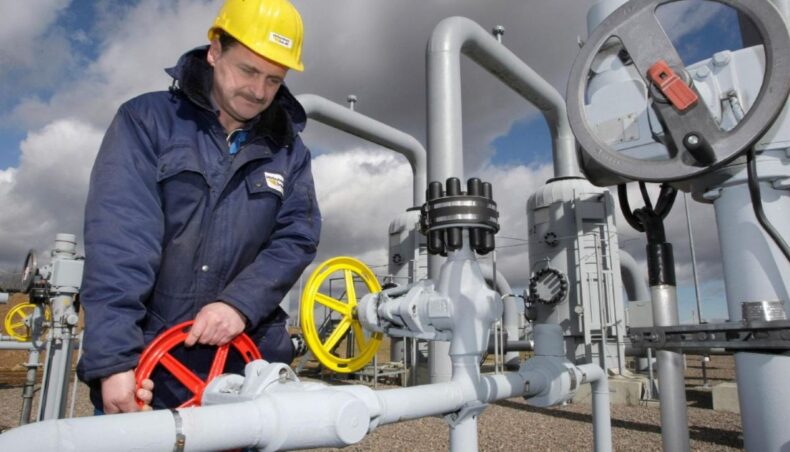In response to a potential Russian gas cutoff, conservative politicians from Germany have reignited the discussion on maintaining the country’s three surviving nuclear power reactors.
Polls also indicate that public support for nuclear energy has increased.
But an extension is extremely sensitive for Germany’s ruling Greens party, which sprung from the anti-nuclear campaign in the 1970s.
After former chancellor Angela Merkel promised to stop using nuclear energy after the Fukushima nuclear accident in 2011, Germany’s three remaining nuclear power reactors are set to be shut down by the end of the year.
In the first quarter of 2022, the plants produced 6% of the electricity in Germany.
Russia’s invasion of Ukraine, which began on February 24, sparked discussion over whether to keep the facilities operating and led Germany to decide to reduce its reliance on Russian fossil fuels.
German experts from the environment and economy ministries stated in March that they did not advise extending the life of the plants, citing difficulties with the plants’ legal, insurance, and licensing requirements, the need for extensive and potentially expensive safety inspections, and a lack of fuel rods to keep the plants operating.
They discovered that an extension wouldn’t increase the nation’s electricity production over the upcoming winter and that the required cost and effort would only be justified if the plants continued to operate for at least another five years until 2028.
However, declining Russian gas supplies through the Nord Stream 1 pipeline to Germany forced the government to re-connect coal power units that were on reserve to the grid.
The potential for a prolonged pipeline outage after routine maintenance that is supposed to be finished by July 21 has given pro-nuclear voices in Germany and Europe more clout.
‘Reduction in Gas Consumption’
The European Union will release suggestions on how nations might reduce their gas consumption in time for the upcoming winter the following week.
One possibility, according to a draught of the suggestions seen by Reuters, would be to delay the retirement of nuclear power reactors or, where practical, the transition from gas to nuclear generating.
According to a survey conducted by RTL/ntv broadcasters last month, 68 percent of Germans support revising the nation’s decision to abandon nuclear power. Only 40% of Germans favored extending the lifespan of nuclear power reactors, according to a ZDF survey conducted before the outbreak of the war in Ukraine.
German Green-run ministries for the environment and economics confirmed this week that their March evaluation was still accurate and that they had not changed their stance in light of worries about the security of the gas supply.
‘Party against Nuclear Power’
Conservative CDU/CSU opposition politicians blame the Greens for the government’s refusal to budge on its stance on the matter, claiming that it was solely ideological in nature given the Greens’ roots in the anti-nuclear campaign of the 1970s.
According to CDU General Secretary Mario Czaja, the Greens are an anti-nuclear party on the inside: “The Greens want to rely on climate-damaging coal-fired power plants.”
In order to keep the reactors operating, Czaja suggested that the government may import fuel rods from Australia and Canada. He also predicted that Economy Minister Robert Habeck would “step away from ideology.”
The three existing nuclear power plants could still be operated safely, according to TUEV, a significant provider of industrial testing and certification, in response to the government’s worries about nuclear safety.
According to Joachim Buehler, managing director at TUEV, “the plants are in a technically outstanding condition,” adding that a thorough inspection, which is typically performed every ten years, was required but could be completed in a matter of months.
Within the ruling coalition of the Social Democrats (SPD), Greens, and liberal Free Democrats (FDP), there are also growing calls for exploring all energy sources, including nuclear.
Reduced gas supplies for heating in the winter may lead to increased consumer usage of electric heating, which would lead to electrical problems, according to Michael Kruse, the FDP parliamentary group’s energy policy spokesperson.
The Russian attack against Ukraine must persuade all politicians to think about this subject without regard to ideology and in a fresh approach, Kruse told Reuters.
Because of the Chernobyl and Fukushima nuclear disasters, the Green Party continues to view nuclear power as a dangerous technology, according to Julia Verlinden, the party’s deputy parliamentary group leader.
According to Verlinden, who spoke to Reuters, “nuclear power is expensive, rigid, and produces radioactive waste for which there is yet no repository.”
Even if nothing can be ruled out at this time, SPD energy policy coordinator Timon Gremmels does not anticipate a change in the government’s stance on the matter if the Nord Stream 1 pipeline resumes operation following maintenance.
Crossing the nuclear red line will be challenging given the Greens’ past, Gremmels told Reuters.
“With fracking gas, a longer term for coal, Habeck is making a lot of demands of his party. Large swaths of the Greens will lose patience if he now introduces nuclear power as well.”













